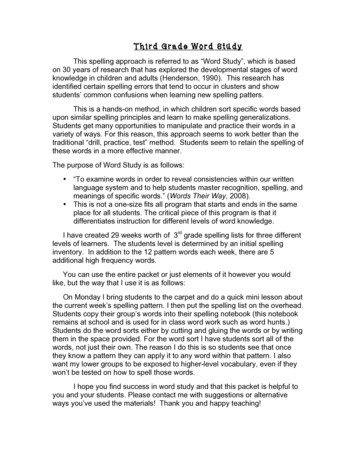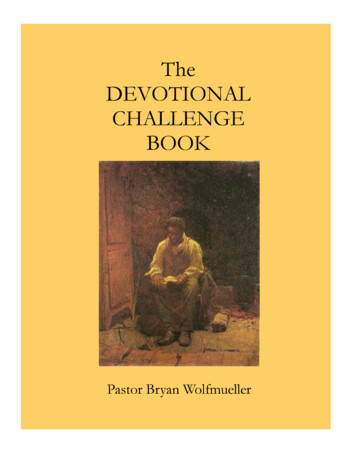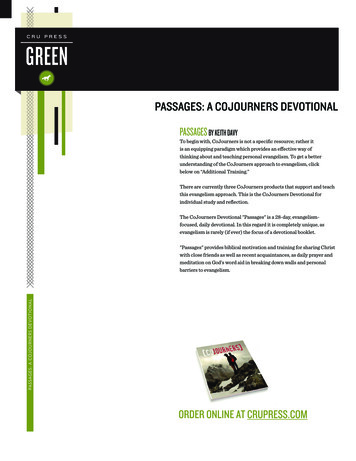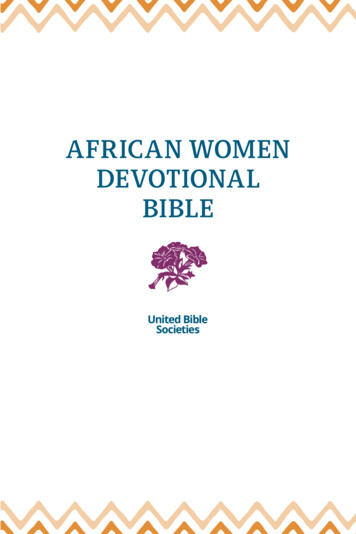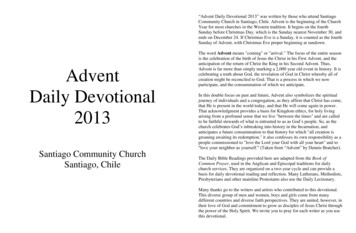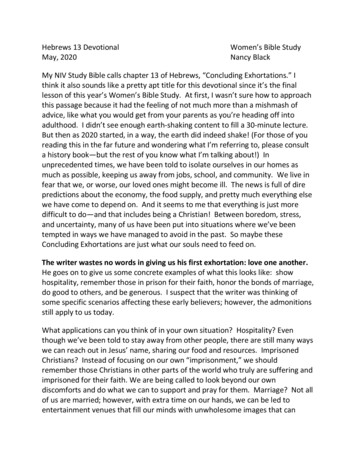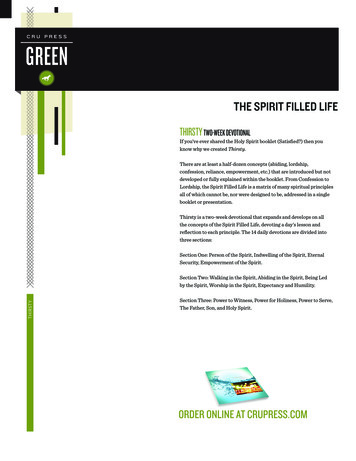
Transcription
THE SPIRIT FILLED LIFETHIRSTY TWO-WEEK DEVOTIONALIf you’ve ever shared the Holy Spirit booklet (Satisfied?) then youknow why we created Thirsty.There are at least a half-dozen concepts (abiding, lordship,confession, reliance, empowerment, etc.) that are introduced but notdeveloped or fully explained within the booklet. From Confession toLordship, the Spirit Filled Life is a matrix of many spiritual principlesall of which cannot be, nor were designed to be, addressed in a singlebooklet or presentation.Thirsty is a two-week devotional that expands and develops on allthe concepts of the Spirit Filled Life, devoting a day’s lesson andreflection to each principle. The 14 daily devotions are divided intothree sections:Section One: Person of the Spirit, Indwelling of the Spirit, EternalSecurity, Empowerment of the Spirit.P OS TCA RDS F RO M COTRHIINRSTTH Y1Section Two: Walking in the Spirit, Abiding in the Spirit, Being Ledby the Spirit, Worship in the Spirit, Expectancy and Humility.Section Three: Power to Witness, Power for Holiness, Power to Serve,The Father, Son, and Holy Spirit.ORDER ONLINE AT CRUPRESS.COM
Growing Movements SeriesA devotional on living aspirit-filled life.THIRSTY14 self-study devotions
ThirstyPublished by CruPress100 Lake Hart Drive, 2500Orlando, FL 32832-0100Written and Developed by Rick JamesDesigned by Mark Arnold (andarnold.com)Editorial Assistance: Neil Downey, Kindra PrideyEdited: Eric Stanford (editresource.com)CruPress is the publishing division of theCampus Ministry of Campus Crusade for ChristAll Scripture quotations taken from the HolyBible, New International Version NIV copyright 1973, 1978, 1984 by InternationalBible Society. Used by permission of ZondervanPublishing House. All rights reserved. 2008 Cru Press, Campus Crusade forChrist, Inc. All rights reserved. No part of thispublication may be reproduced, stored in aretrieval system, or transmitted,recording or otherwise, without the priorpermission of CruPress.ISBN –1-57334-071-5THIRSTY?
The phrase Jesus used, “living water,” was meant to evoke, among other Scriptures, Jeremiah2:13: “My people have committed two sins: They have forsaken me, the spring of living water,and have dug their own cisterns, broken cisterns that cannot hold water.”But even if we didn’t know Jeremiah 2:13, we could have understood Jesus’ implication by hisuse of the phrase “living water.” Sounds poetic, even mystical, doesn’t it? But Jesus didn’t usethe term “living water” poetically or mystically. Living water was another term for freshwater,the stuff you use to water plants and animals, grow crops, clean dishes—the stuff you drink tolive. And, importantly, it stands in opposition, not to stagnant (dead) water, but to saltwater.Saltwater looks and feels like fresh, or living, water, butif you drink it for any lengthof time,it kills you. A person could be stranded in themiddle of the ocean floating atop a gazillion gallons of it anddie of thirst. The more you drink saltwater, the thirstier you get. If there’s a better picture forsin, please stop me at any point.And so here we are again, back at the basic meaning of Jeremiah 2:13. It’s not just that oursouls need living water or we’ll die of spiritual thirst; it’s that we’re dying of thirst because wedrink from alternative wells, chugging down saltwater instead of fresh. What our souls thirstfor is Christ, whom we experience by the Spirit.Like the body, the soul can’t go very long without water. And so everyone, most every day,gets thirsty, as experienced in innumerable forms: insecurity, unforgiveness, meaninglessness,loneliness, hopelessness, emptiness, boredom, dissatisfaction, worry, anxiety, and so on. Oursouls are constantly crying out for something to drink. So we drink.Introduction.Have you ever felt that this can’t be all there is—that somehow there must be somethingdeeper, something more to the Christian life? Something you don’t need to act out but a palpable source of energy and life flowing from the heart? Not behavior modification by your owneffort and discipline but life transformation through God’s power? Jesus clearly taught thatthere was when he said, “if anyone is thirsty, let him come to me and drink. Whoever believesin me, as the Scripture has said, streams of living water will flow from within him.” John goeson to tell us, “By this he meant the Spirit” (John 7:37-39). According to Jesus, the Holy Spirit isthe source of that “something more,” the source of what’s missing.But all temporal forms of refreshment (sex, drugs, success, fame, busyness, entertainment,travel, materialism) are, in the end, saltwater. In the moment, they taste and feel like water tothe lips but they only succeed in making us thirstier. If we persist in drinking them, they arespiritually terminal.But this isn’t the worst tragedy. The greater tragedy by far is that those of us who have cometo know Christ continue to drink the same saltwater that unbelievers drink, though perhaps inmore socially acceptable forms.When we feel the thirst of insecurity, for example, do we turn to the Lord or do we buy
clothes, lift weights, clamor for attention, flirt, judge others or put others down, or get jealous?When we feel the thirst of loneliness or dissatisfaction, do we turn to the Lord or do we eat, watchTV, play on the computer, fantasize, sleep?When we need confidence, do we rely upon God or jack ourselves up with music,coffee, nicotine, Red Bull, new clothes, self-talk, cool speech? Towhat are we turning to satisfy those thirsts?Though we haveliving water (theHoly Spirit) within us, wesatisfy our thirst in much thesame ways unbelievers do. Maybewe’ve stopped having premarital sex ortaking illicit drugs—maybe—but that doesn’tmean we’re not turning to saltwater. In truth, we’reoften consuming it daily . . . by the gallon.And this, when you clear everything else away, is at the coreof our dissatisfaction and thirst: we are not filled and do not walkwith, or drink from, the Spirit in the way we could or should.Now, it could be that we just don’t know any better. Maybe we never even knew the source of livingwater was within us. Or maybe we thought we were supposed to gut out a godly life in our ownstrength through discipline and abstinence. Maybe this is all we’ve ever seen modeled. Whatever thereason, it doesn’t matter, because we are going to change all that.For the next two weeks, we are going to learn what it is to be filled, directed, and empowered by theSpirit. We are going to learn how to drink and satisfy our thirst the way God intended.This devotional contains three sections. The first focuses on the scriptural and doctrinal foundationsof the Spirit-filled life: what the Bible says concerning God’s Spirit indwelling us. The second sectionwill look at how we walk in, and experience, the Spirit’s empowerment. And the last section exploresthe practical ways this empowerment overflows in love and service. If you fully engage for the nextfourteen days, I guarantee your relationship with Jesus will never be the same.Section One:Section TWO:Section Three:Indwelt by the SpiritInfluence of the SpiritOverflow of the EDATMOSPHEREAWAKENAKEDPOWER TO WITNESSPOWER FOR HOLINESSPOWER TO SERVEFATHER, SON, & HOLY SPIRITSTEPS
BELIEVE IN GOD, THE FATHER ALMIGHTY, CREATOR OF HEAVEN ANDARTH. I BELIEVE IN JESUS CHRIST, GOD’S ONLY SON, OUR LORD,WHO WAS CONCEIVED BY THE HOLY SPIRIT, BORN OF THE VIRGINMARY. I BELIEVE IN THE HOLY SPIRIT, THE HOLY CATHOLIC CHURCH,HE COMMUNION OF THE SAINTS, THE FORGIVENESS OF SINS, THERESURRECTION OF THE BODY, AND LIFE EVERLASTING. AMEN.12345678910Therefore go and make disciples of all nations,baptizing them in the name of the Father and ofthe Son and of the Holy Spirit.Which image do you think best represents people’s general understandingof the Holy Spirit?Matthew 28:19Which image best represents the Holy Spirit to you? Why that image?In your mind, which images do a lousy job of representing the HolySpirit’s identity? Why?If you had to come up with your own image, what would it be?What do you envision when you think about the Holy Spirit?What are some the conceptual distortions about the Holy Spirit pictured in someof the images above?Why is image 3 so often used when depicting the Holy Spirit?introducing the holy Spirit.Read John 16:5-15. In this discourse Jesus gives a formal introduction to the third person ofthe Trinity. Write what you learn from the passage about the Holy Spirit and why he was sent.
Flatland. In 1884, Edwin Abbot wrote “Flatland,” an imaginative story of life in athe person of the Spirit.two-dimensional world. The protagonist is A. Square, and as the name suggests, he’ssimply a flat shape—lines on a page. The story illuminates the difficulty of picturing3-D life for a two-dimensional being. A. Square, for example, can only experience asphere as a flat circle, for in Flatland the concept of depth is unfathomable. Flatlandis still used in math today as a helpful analogy to explain the difficulty of envisioninga fourth spatial dimension.Personhood is not a matter of having feet or eyebrows but rather of having attributes of being such as intellect, agency(the ability to act), will, emotion, and identity. Below are some of the major biblical passages that affirm the uniquepersonhood of the Spirit. Look up each and record what aspect of personhood is described.Acts 5:3Romans 15:301 Corinthians 2:10; 12:11Ephesians 4:30the holy Spirit in the old testament.While the identity of the Holy Spirit is not fully revealed until the New Testament, most scholars see inferences about him in OldTestament passages such as Genesis 1:26-27. What Holy Spirit inferences do you see in these opening verses of Scripture?God sa id, “let us m a k e m a n in our im aGe, in our lik eness, a nd let them ruleov er the fish of the se a a nd the birds of the a ir, ov er the li v estock, ov era ll the e a rth, a nd ov er a ll the cre atures th at mov e a lonG the Grou nd.” soGod cre ated m a n in his ow n im aGe, in the im aGe of God he cre ated him; m a lea nd fem a le he cre ated them. Genesis 1:26-27Is there something to be learned about the nature of God in the nature and creation of man?Why do you think that God did not fully disclose his triune nature (Trinity) until the coming of Jesus?the trinity.How would you clarify the Trinity to someone who thinks you believe in three gods?While the term “Trinity” is never used in Scripture, the personhood and deity of the Father, Son, andHoly Spirit are clearly taught. If we were to summarize the New Testament doctrine of the Trinity, itwould be as follows: God is three distinct persons; each person is fully God; there is one God.The greatest minds of the last two thousand years have generally conceded that while we can statethese three truths with clarity, like the mathematical concept of a fourth spatial dimension or the mysteryof human consciousness, the Trinity is beyond our human capacity to perceive or envision.Incomprehensible as it may be, there has been no shortage of illustrations offered over the years that attempt to explainthe Trinity. To a degree, they are all helpful. But, to a degree, they are all deficient. Below are some of the better known ofthe illustrations. Look at each, and if you can, write down what it tries to communicate and where the analogy fails.Water illustrates the Trinity in that it can manifest itself in three forms: liquid, vapor, and ice.An egg illustrates the Trinity in that it is made up of three constituent parts: shell, egg white, and yolk.Sex illustrates the Trinity because, in the consummation of marriage, two people, to the extentpossible, become one.A plant illustrates the Trinity, with the Father as the root, the Son as the shoot that breaks forthinto the world, and the Spirit as that which spreads beauty and fragrance.A person illustrates the Trinity in the union and interdependence of intellect, emotion, and will.As these illustrations are not all equal in their descriptive insight, which do you find most helpful?The Trinity is one of many mysteries surrounding God that can freeze the brain when pondered too long. What othermysteries about God do you wrestle with?How all three persons comprise one God may not be as clear as we’d like. What is clear is that the doctrine of the Trinity istrue and that each member of the Trinity plays a distinct role in our salvation, for we “have been chosen according to theforeknowledge of God the Father, through the sanctifying work of the Spirit, for obedience to Jesus Christ and sprinklingby his blood” (1 Peter 1:2). It is also clear that the mission and ministry of the Spirit are to bring glory to the Son. The Spiritlabors in us to focus our mind, affections, worship, and service toward “our great God and Savior, Jesus Christ” (Titus 2:13).What i know now.Since we’ve touched on some abstract ideas, try to process the content through answering these two questions:How I viewed the Holy Spirit in the past:How I view him now:
Okay, sO yOu enter a rOOm and there yOu find the fOllOwing peOple:twO pOwerful pOlitical figures (Barack OBama and mayBe hillaryclintOn), a cOuple Of spOrts icOns (like tOm Brady and tiger wOOds),yOur twO favOrite musicians (let’s say dave matthews and BeyOnce),and twO actOrs whO define Beauty (such as Brad pitt and angelinaJOlie). that’s the scenariO. nOw . . .Whose presence would you find most intimidating?I AM WHO I AM ADONAI JEHOVA ROPHE GOD ALMIGHTY FATHER LORD ELOHIM EL SHADDAI ELELYON YESHUA FIRST AND LAST ALPHA ANDOMEGA LIVING GOD EL ROI HOLY ONE GREATSHEPHERD LORD OF HOSTS GOD MOST HIGHEVERLASTING GOD KURIOS WORD MAKER GODONLY WISE REDEEMER ADONAI AVINU CREATORHOLY GLORY ETERNAL IMMANUELHow would you feel in his or her presence? Why?Which inspires a greater sense of awe in you: being in the presence of beauty, power,genius, or talent? Why?Now imagine what it would be like to stand in the presence of God. Write down the firstfive words that come to your mind (“Terrifying”? “Blinding”?).Were your initial thoughts physical (the appearance), emotional (exciting, terrifying), orspiritual (unworthy, guilty)? Why, do you think?How do these thoughts or feelings differ from those that come from being in the presence of celebrities?old testament encounters.And in him you too are being built together to becomea dwelling in which God lives by his Spirit.ephesians 2:22Look up the following verses and make notes of three things: Whatdoes God communicate about himself? What does he use to communicate it? What emotions might be evoked by that particular demonstration of his character?The Israelites’ experience: Exodus 19:9-20Moses’ experience: Exodus 33:14—34:8Elijah’s experience: 1 Kings 19:9-13
the story of God’s presence and the temple.From the time Moses led the Israelites out of Egypt, God’s presence had dwelled withthem in a unique way. A portable tent, or tabernacle, was erected for God’s residenceamong them. And yet it wasn’t until some 450 years after their Red Sea crossing that KingDavid’s son Solomon built a permanent structure in Jerusalem, a temple, to be the earthlyfocal point of God’s dwelling among his people. Upon the completion of the temple, therewas an inauguration ceremony that concluded with Solomon praying as follows:now arise, o lord God, and come to your restinG pl ace,you a nd the ark of your miGht. m ay your priests, o lord God, be clothed w ithsalvation, m ay your saints rejoice in your Goodness. o lord God, do not rejectyour a nointed one. remember the Gre at lov e promised to dav id your serva nt.when solomon finished his pr ayer, fire came down from heaven and consumed theburnt offerinG and the sacrifices, and the Glory of the lord filled the temple.the priests could not enter the temple of the lord bec ause the Glory of thelord filled it. w hen a ll the isr a elites saw the fire cominG dow n a nd theGlory of the lord a bov e the temple, they k nelt on the pav emen t w ith theirfaces to the Grou nd, a nd they worshiped a nd Gav e th a nk s to the lord, sayinG, “he is Good; his lov e endures fore v er.” 2 chronicles 6:41—7:3All in all, a pretty wild demonstration of God’s power as his presence filled the temple. And, by the way, this was a onetime performance. While God’s presence continued to dwell in the temple throughout Israel’s history, it was only at theinauguration (the grand opening so-to-speak) that we witness such a dramatic scene—God visibly demonstrating thathis presence now dwelled in the temple among his people. Another event wouldn’t occur like this until after Jesus hadbeen raised. And it’s that event that we want to look at next.the new temple.Read Acts 2.Pentecost was a Jewish harvest festival celebrating the firstfruits of the coming harvest. How does this backdrop aid ourunderstanding of the event?According to God’s Word, the moment you trusted Christ, the Holy Spiritwas given to you and indwells you. You are now God’s temple. “You alsowere included in Christ when you heard the word of truth, the gospel ofyour salvation. Having believed, you were marked in him with a seal, thepromised Holy Spirit” (Ephesians 1:13).Like the filling of the Jerusalem temple, the Pentecost event in Acts 2 wasa unique display of God’s empowering presence. Typically, our experienceof God’s indwelling lacks this supernatural commotion. Rather, this issomething we are to take by faith in what Scripture has promised, and whatit’s promised is that God lives in you and will never leave.As best you can remember, when did you place your faith in Christ? What were the circumstances surrounding yourdecision?As you let your mind mull over this fact—that through the Holy Spirit, God actually indwells you—what are some of theimmediate implications that come to mind?Tracing the word “filled” in a single chapter of Acts sheds light on the way in which we feel and experience the Spirit’s presence:Saul, who was also called Paul, filled w ith the holy spirit . . .W hen the Jews saw the crowds, they w ere filled w ith je a lousy. . . .The disciples w ere filled w ith joy a nd w ith the holy spirit.act 13:9, 45, 52, eMphasis addedHow is being filled with the Spirit similar to be filled with joy or jealousy? How is it different?Why do you think God makes his influence and presence so subtle in our lives, working in concert with our own thoughtsand emotions rather than overriding them?Why do you think God chose speaking in different languages as a sign of his presence among the church?How have you experienced or felt the Spirit’s presence or influence in your life since becoming a Christian?What other tangible results or outworkings of the Spirit’s presence do you see in this chapter?How were the disciples different as a result of the Spirit’s presence?In light of the fear and awe associated with God’s presence throughout Israel’s history, how do you think the disciples feltwhen they realized that they were the new temple? (Excited? Paranoid?)What variables might affect how much you feel or experience the Spirit’s influence? Put another way, are there things youcan do to increase or decrease the Spirit’s influence upon your thoughts and actions?As the Lord indwells you, your life is now his home. What about your life right now do you think Jesus would want tochange to make his new temple more of a “holy dwelling”?
He anointed us, set his seal of ownership onus, and put his Spirit in our hearts as a deposit,guaranteeing what is to come. 2 corinthians 1:21,22Having believed, you were marked in him witha seal, the promised Holy Spirit. ephesians 1:13King of Aboh.WE HAVE FORGIVENESS OF SINWE HAVE BEEN MADE HOLYWE HAVE ETERNAL LIFEWE HAVE REDEMPTIONYOU ARE HOLY AND CHOSENYOU ARE BLESSEDYOU ARE ALL SONS OF GODYOU ARE THE PEOPLE OF GODYOU ARE LIGHT IN THE LORDYOU HAVE BEEN SAVED BY GRACEYOU HAVE BEEN RECONCILEDYOU HAVE FULLNESS IN CHRISTYOU HAVE BEEN SET FREEMarty Johnson knew he was the product of two young college students whohad a brief affair. Neither parent was prepared to deal with raising a child, soJohnson was given up for adoption and grew up in Minnesota. Years later, as anadult, he started digging through past records and got in contact with his birthmother. Then a letter arrived one day that said, “Welcome to the Ogike dynasty!You come from a noble and prestigious family.” The letter went on to explainthat Johnson was the next in line to inherit the position of village chief from hisbiological father, John Ogike, the current chief of Aboh village in Nigeria.1{aBc news)Letter to the ephesians.Read Ephesians 1:1-14. Write down all those things that you have inherited in Christ.Wherever it says “us” or “we,” change it to “I” or “me.”We’ve all experienced spiritual worries (Can I lose my salvation? What if I fall awayfrom God? Am I the Antichrist?). Write down those things that have caused you someanxiety or insecurity in your relationship with Christ.Which of the truths in Ephesians 1 provides you the most comfort or security?
Yo.Dalton Conley is a sociologist at New York University. He and his wife, Natalie Jeremijenko,have two children. They recently sought permission with the city of New York to changetheir four-year-old son’s name to Yo Xing Heyno Augustus Eisner Alexander Weiser KnucklesJeremijenko-Conley. At home, the boy is known as Yo2. chicaGo triBuneWrite out a new name for yourself, perhaps an even longer name than Yo’s, that encapsulates what is true of you inChrist. (Think of names like Saved, Loved, or Redeemed, as opposed to Eisner, Weiser, or Knuckles.)Downpayment.Ephesians 1:1-14 demonstrates the distinct roles the persons of the Trinity play in your salvation. Describe their differing roles:FatherSonHoly SpiritEphesians 1:14 states that the Holy Spirit is a “deposit guaranteeing our inheritance until the redemption of those whoare God’s possession.” An insanely powerful passage, if you reflect on the keywords. So let’s reflect on the keywords. Tryto define what each word means on your own—or look it up. Just pondering a dictionary definition can open up newwindows of meaning from the ssionWhich do you find most meaningful? How are any of these truths currently changing how you think, believe, act?Why do you think God wants us to know that we can never lose our relationship with him? Why isn’t he concerned that thiswill give us the freedom to sin more?Sealed.In Ephesians 1:13, Paul writes, “Having believed, you were marked in him with a seal, the promised Holy Spirit.” The word‘sealed’ has a range of meanings. All of the following images are sealed in some way:With these in mind, write out all of the implications of what it means to be sealed by the Holy Spirit?Adoption.The apostle John describes our conversion with an analogy from human birth: “to a ll w ho recei v ed him,to those w ho belie v ed in his na me, he Gav e the riGht to become children of God —children bor n not of natur a l descen t, nor of hu m a n decision or a husba nd’s w ill,bu t bor n of God.” John 1:12-13As our spiritual birth was outside the realm of “human decision,” what does this mean to your security as a child of God?It might be helpful to reflect upon this: no matter what you do, relationally and genetically you can never cease to be yourparent’s child. Your parentage is what it is, and by virtue of your birth, it’s irreversible.Ephesians 1:4-5 tells us that “in love he predestined us to be adopted.” While you may never have signed papers fromsome heavenly adoption agency, you have, in fact, been adopted into God’s family—and the indwelling of the Holy Spiritis assurance and confirmation of this. Not to be cute, but in order to forge it into our hearts, finish filling out the particulars of this affirmation of your adoption.
the tyranny of F ma.F ma is why skateboarding is painful, why faces (and other things) sag, and why airlinesstay in business. It’s the equation that describes the law of gravity. There are also moral laws,and just like their physical counterparts, they are binding on all of us. Which of the followingmoral laws do you find most difficult to keep?Do Not Lie; Do Not Lust; Do Not Hate; Do Not Gossip; Do Not Worry; Do Not Covet;Love the Lord Your God with All Your Heart, Soul, and Mind.If you could be exempt from any one of these moral laws, which would you choose?Do you think people who have never read the Bible know these moral laws exist?(Look at Romans 1.)Do not get drunk on wine, which leads todebauchery. Instead, be filled with the Spirit.And I will put my Spirit in you and moveyou to follow my decrees and be carefulto keep my laws.ephesians 5:18ezekiel 36:27A plane flies due to the ingenious shape of its wings. Higher air pressure under the wingactually lifts the plane and cancels out the law of gravity. This principle is famously knownas Bernoulli’s principle. In an interesting parallel, Romans 7 and 8 describe the inescapablegravity of the law of sin, which is binding on all of us—all of us, that is, except those living bythe law of the Spirit. The law of the Spirit is able to cancel out sin’s gravity.the Law of Gravity.Read Romans 7:7-25What does Paul mean when he says, “i do not u ndersta nd w h at i do.for w h at i wa n t to do i do not do, bu t w h at i h ate i do” roM ans 7:15In speaking of the Old Testament commandments, Paul seems to indicate that they actuallyincreased the desire to sin. How have you experienced this effect with laws and rules?What, then, was the point of God giving us the commandments (the law)?
In what ways have you experienced, or are you experiencing, this “law of sin” in your life?Power outage.When a hurricane hit South Florida, Norena’s home was one of many severely damaged. The elderlywoman received an insurance settlement for repairs. However the contractor took her money andskipped town leaving an unfinished home with no electricity. Norena has been living without powerever since.The astounding part of this story is that the hurricane was Hurricane Andrew. Norena has been livingin the dark since 1992: no heat, no air conditioning, not one hot shower. Without money to finishthe repairs, Norena just got by with a small lamp and a single burner. Acting on a tip, the mayor ofMiami-Dade got involved. It only took a few hours of work by an electrical contractor to return powerto the house. “It’s hard to describe having [the electricity] . . . to switch on,” she said. “It’s overwhelming.”3the principle of flight.Though the Spirit indwells us the moment we trust Christ, most believers live out their Christian life under their ownstrength and self-effort. That’s not the Christian life. Not even close. To use the airplane metaphor, our best efforts cannotprevail against the gravity of sin and our sinful nature. In fact, the harder we try, the stronger the pull of gravity. Whathappens, for example, when I say, “Whatever you do, do not look at the paper airplane”? It made you want to look more,didn’t it? Moral laws make us aware of our sin problem, but they are powerless to fix it, powerless to transform us. Theyare an x-ray machine alerting us to our moral problem, not a doctor able to fix it.The only way to overcome the law of sin is by a new principle: the law of the Spirit.“throuGh christ jesus the l aw of the spirit of life set mefree from the l aw of sin a nd de ath.” roM ans 8:2When referring to our sin nature, Paul often uses the word “flesh”—a great word that connotes our deeply engrainedhabits of sin. (Some Bible translations leave the word “flesh,” but others replace it with “sin nature” for clarity.) Our fleshis strongest in those areas where we cultivated its influence and gave ourselves over to its indulgence. In what ways orareas of your life did you do this? Where is your flesh strongest?While the Scriptures elsewhere answer, “How are we to live by the Spirit?” they do not do so here. What is highlighted isthe reality of both indwelling influences and the choice we have to live according to one or the other. In the devotionsthat follow we’ll look closely at how to live by the Spirit. But before we do, it’s important to reflect on this question: howare you currently attempting to “put to death the misdeeds of the body” (Romans 8:13) and grow in holiness? Describe:How, as they say, is that working out for you?Write a note to God, giving voice to any questions or frustrations you’ve had in your struggle with sin:God often allows us to struggle in our self-effort because we need to come to the end of ourselves before we are readyto begin walking in reliance upon his Spirit. Walking in the Spirit and being filled and empowered is a lifestyle, and learning is a lifelong process. For now, we just want to take the first step to which Romans 8 calls us, and that is to decide towalk in step with God’s Spirit. There are three important questions you need to ask yourself, which in fact comprise thisdecision:Are you willing to surrender control of your life to the Lord Jesus Christ?Are you willing to confess sin and turn from it as God reveals it to you?roman law.Carefully read Romans 7:24—8:18. What is condemnation? Why are we free from it?What difference does this make, or should this make, to us?In this passage we find living by the law and living by the Spirit contrasted. Write out those contrasts.As referenced in Romans 8:18, we won’t have a sin nature in heaven. Currently, however, we are indwelt by both the Spiritand our sinful nature, and therein lies our struggle. In what area of your life are you most experiencing this struggle?What might be some of God’s purposes in allowing this struggle and not removing our sin nature here and now?Do you sincerely desire to be directed and empowered by the Holy Spirit?If you can say yes to these questions, then you can pray right now. Ask God—from this point forward—to lead, direct,and empower your life through his indwelling Spirit. Also
of the Spirit-filled life: what the Bible says concerning God’s Spirit indwelling us. The second section will look at how we walk in, and experience, the Spirit’s empowerment. And the last section explores the practical ways this empowerment overfl

